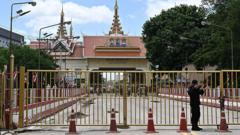In the run-up to new presidential elections in Romania, a scandal involving TikTok influencers and accusations of foreign interference has put the political landscape into upheaval. Following the controversial annulment of the first-round elections last December, which saw far-right candidate Calin Georgescu emerge as an unexpected frontrunner, the country faces renewed scrutiny. Georgescu’s surprising rise, driven largely by populist TikTok campaigns, has been marred by allegations of Russian meddling, and he is now barred from competing following his detention for charges including an attempt to undermine the constitutional order.
TikTok Influencers at the Center of Romanian Election Scandal

TikTok Influencers at the Center of Romanian Election Scandal
This article delves into the role of TikTok influencers in a Romanian election crisis sparked by accusations of foreign interference and social media manipulation.
The TikTok phenomenon surrounding the elections highlights a complex interplay of social media dynamics and political campaigns. Georgescu, a previously unknown candidate, received nearly 23% of the vote due to viral TikTok content portraying him in various amiable, relatable scenarios. Despite authorities suggesting that pro-Georgescu social media campaigns were orchestrated by foreign actors and calculated manipulation of the TikTok algorithm, the evidence remains largely circumstantial. TikTok has indicated proactive measures to eliminate fake accounts and restrict disinformation, yet many Romanians remain frustrated over the lack of transparent findings regarding alleged Russian interference.
As the election re-run approaches, interest is particularly intense about George Simion, leader of the radical AUR party, who is currently leading in polls. Insights into the TikTok influencer network indicate a commercialized nature of influencer politics, as many were paid to promote political messages without clearly disclosing the financial relationships involved. Some influencers allege they were not aware of any targeted agendas, arguing their posts merely encouraged civic participation rather than specific candidate endorsements.
Investigations continue, both at the national level and within the European Union, striving to uncover the full extent of the campaigning strategies employed during a time of political volatility. As this story unfolds, the challenge lies in delivering clarity regarding the intersection of technology, influence, and electoral integrity—issues that resonate well beyond Romania’s borders.
Despite ongoing investigations, the situation underscores a growing concern over social media’s role in politics, leading to calls for more comprehensive accountability measures across platforms like TikTok. As analysts seek to piece together this puzzle, they anticipate that the full narrative—including evidence of foreign influence—will take considerable time to illuminate, continuing a watchful eye on the integrity of democratic processes.
As the election re-run approaches, interest is particularly intense about George Simion, leader of the radical AUR party, who is currently leading in polls. Insights into the TikTok influencer network indicate a commercialized nature of influencer politics, as many were paid to promote political messages without clearly disclosing the financial relationships involved. Some influencers allege they were not aware of any targeted agendas, arguing their posts merely encouraged civic participation rather than specific candidate endorsements.
Investigations continue, both at the national level and within the European Union, striving to uncover the full extent of the campaigning strategies employed during a time of political volatility. As this story unfolds, the challenge lies in delivering clarity regarding the intersection of technology, influence, and electoral integrity—issues that resonate well beyond Romania’s borders.
Despite ongoing investigations, the situation underscores a growing concern over social media’s role in politics, leading to calls for more comprehensive accountability measures across platforms like TikTok. As analysts seek to piece together this puzzle, they anticipate that the full narrative—including evidence of foreign influence—will take considerable time to illuminate, continuing a watchful eye on the integrity of democratic processes.





















